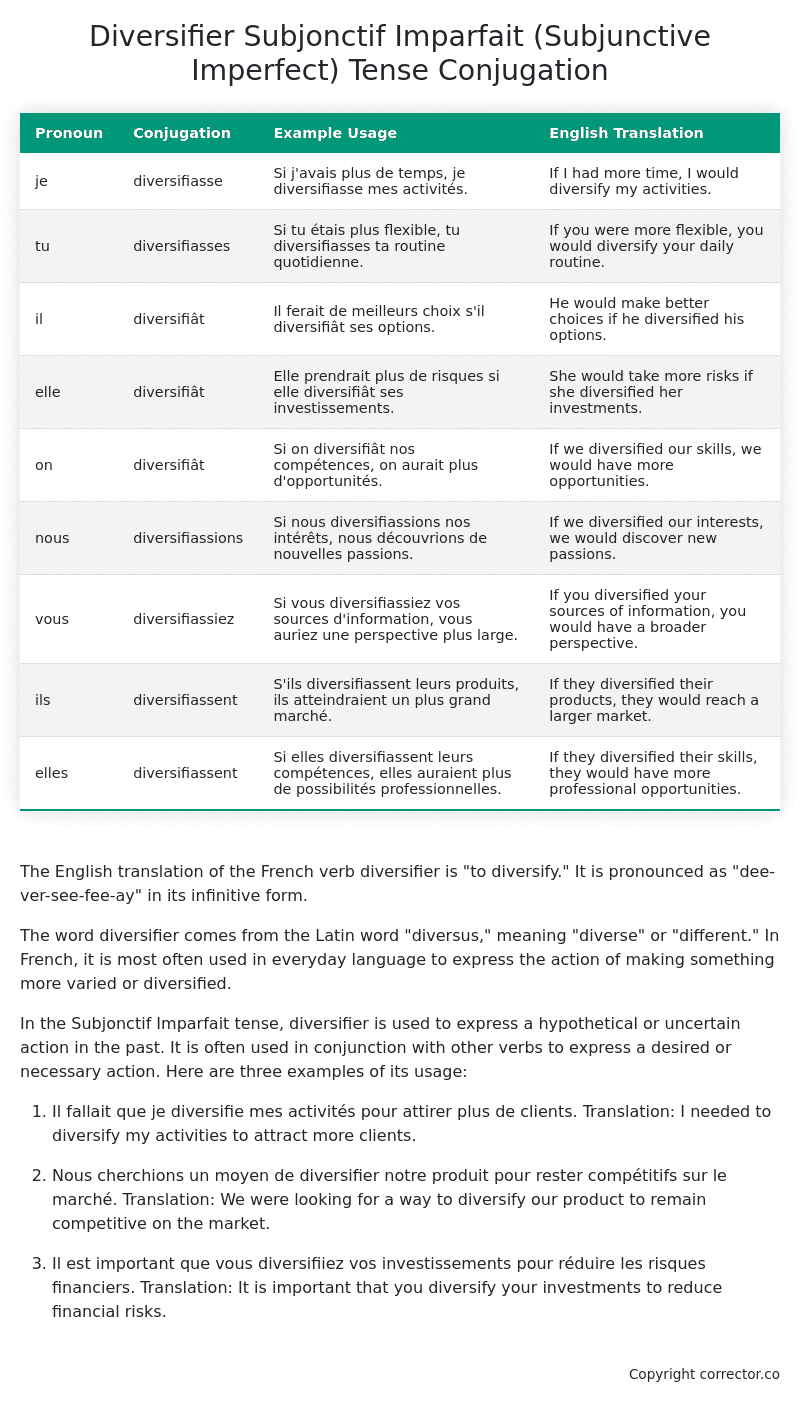Subjonctif Imparfait (Subjunctive Imperfect) Tense Conjugation of the French Verb diversifier
Introduction to the verb diversifier
The English translation of the French verb diversifier is “to diversify.” It is pronounced as “dee-ver-see-fee-ay” in its infinitive form.
The word diversifier comes from the Latin word “diversus,” meaning “diverse” or “different.” In French, it is most often used in everyday language to express the action of making something more varied or diversified.
In the Subjonctif Imparfait tense, diversifier is used to express a hypothetical or uncertain action in the past. It is often used in conjunction with other verbs to express a desired or necessary action. Here are three examples of its usage:
-
Il fallait que je diversifie mes activités pour attirer plus de clients.
Translation: I needed to diversify my activities to attract more clients. -
Nous cherchions un moyen de diversifier notre produit pour rester compétitifs sur le marché.
Translation: We were looking for a way to diversify our product to remain competitive on the market. -
Il est important que vous diversifiiez vos investissements pour réduire les risques financiers.
Translation: It is important that you diversify your investments to reduce financial risks.
Table of the Subjonctif Imparfait (Subjunctive Imperfect) Tense Conjugation of diversifier
| Pronoun | Conjugation | Example Usage | English Translation |
|---|---|---|---|
| je | diversifiasse | Si j’avais plus de temps, je diversifiasse mes activités. | If I had more time, I would diversify my activities. |
| tu | diversifiasses | Si tu étais plus flexible, tu diversifiasses ta routine quotidienne. | If you were more flexible, you would diversify your daily routine. |
| il | diversifiât | Il ferait de meilleurs choix s’il diversifiât ses options. | He would make better choices if he diversified his options. |
| elle | diversifiât | Elle prendrait plus de risques si elle diversifiât ses investissements. | She would take more risks if she diversified her investments. |
| on | diversifiât | Si on diversifiât nos compétences, on aurait plus d’opportunités. | If we diversified our skills, we would have more opportunities. |
| nous | diversifiassions | Si nous diversifiassions nos intérêts, nous découvrions de nouvelles passions. | If we diversified our interests, we would discover new passions. |
| vous | diversifiassiez | Si vous diversifiassiez vos sources d’information, vous auriez une perspective plus large. | If you diversified your sources of information, you would have a broader perspective. |
| ils | diversifiassent | S’ils diversifiassent leurs produits, ils atteindraient un plus grand marché. | If they diversified their products, they would reach a larger market. |
| elles | diversifiassent | Si elles diversifiassent leurs compétences, elles auraient plus de possibilités professionnelles. | If they diversified their skills, they would have more professional opportunities. |
Other Conjugations for Diversifier.
Le Present (Present Tense) Conjugation of the French Verb diversifier
Imparfait (Imperfect) Tense Conjugation of the French Verb diversifier
Passé Simple (Simple Past) Tense Conjugation of the French Verb diversifier
Passé Composé (Present Perfect) Tense Conjugation of the French Verb diversifier
Futur Simple (Simple Future) Tense Conjugation of the French Verb diversifier
Futur Proche (Near Future) Tense Conjugation of the French Verb diversifier
Plus-que-parfait (Pluperfect) Tense Conjugation of the French Verb diversifier
Passé Antérieur (Past Anterior) Tense Conjugation of the French Verb diversifier
Futur Antérieur (Future Anterior) Tense Conjugation of the French Verb diversifier
Subjonctif Présent (Subjunctive Present) Tense Conjugation of the French Verb diversifier
Subjonctif Passé (Subjunctive Past) Tense Conjugation of the French Verb diversifier
Subjonctif Imparfait (Subjunctive Imperfect) Tense Conjugation of the French Verb diversifier (this article)
Conditionnel Présent (Conditional Present) Tense Conjugation of the French Verb diversifier
Conditionnel Passé (Conditional Past) Tense Conjugation of the French Verb diversifier
L’impératif Présent (Imperative Present) Tense Conjugation of the French Verb diversifier
L’infinitif Présent (Infinitive Present) Tense Conjugation of the French Verb diversifier
Struggling with French verbs or the language in general? Why not use our free French Grammar Checker – no registration required!
Get a FREE Download Study Sheet of this Conjugation 🔥
Simply right click the image below, click “save image” and get your free reference for the diversifier Subjonctif Imparfait tense conjugation!

Diversifier – About the French Subjonctif Imparfait (Subjunctive Imperfect) Tense
Formation
Common Everyday Usage Patterns
Interactions with Other Tenses
Subjonctif Présent
Indicatif Passé Composé
Conditional
Conditional Perfect
Summary
I hope you enjoyed this article on the verb diversifier. Still in a learning mood? Check out another TOTALLY random French verb conjugation!


